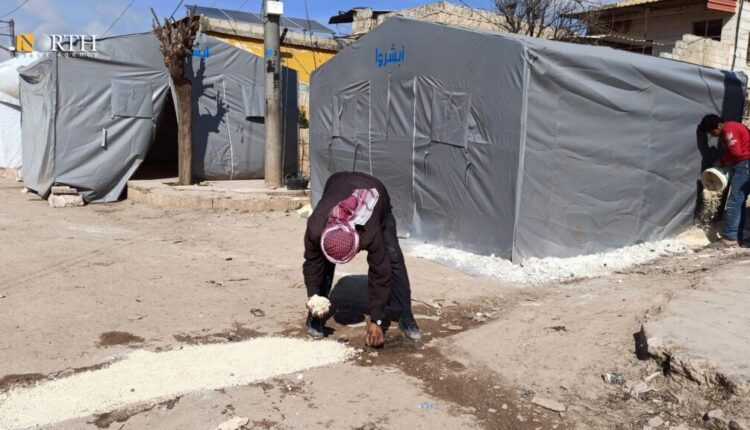
AFRIN, Syria (North Press) – People of the town of Jindires in Afrin countryside, northwestern Syria, are astonished at the amount of aid that has entered the region, as they have yet to receive anything.
On Feb. 6, a 7.8 magnitude earthquake hit southern Turkey and northwestern Syria, killing about 46.000 individuals and destroying hundreds of buildings, leaving many homeless.
“There are a lot of NGOs in the region. However, how come a relief and humanitarian aid distribution system is missing?” Youssef Hamsho, from Jindires, wonders.
“Some people get more than they need, meanwhile others get nothing at all,” he said.
“There is no one you can talk or complain to. Hundreds of people chase after aid trucks, but I cannot act like them,” he added, noting the chaos in the region.
Random Distribution
Asaad al-Ali, 44, from Jindires, said that aid is not reaching the needy.
He recalls an incident that he witnessed himself. “I saw a man riding a motorcycle and carrying a food parcel he received from an organization, which he then sold in a shop.”
Al-Ali demands NGOs “distribute aid according to personal IDs or identification papers.” He believes this way will ensure everyone gets their fair share.
“Affected people do not benefit from random distribution,” he noted.
Very Little
Although it has been 17 days since the devastating earthquake that struck north Syria, Suhaib al-Nayef, a settler who has been in Jindires after the Turkish occupation, has received only one food parcel, which is worth no more than $10.
Al-Nayef, 43, said, “The aid that reached Jindires can cover the need of dozens or maybe hundreds of thousands of people, but the affected people received only a little.”
The earthquake destroyed his house. “The facade and even the ceiling cracked significantly, now water spills in most rooms although it is a ground-floor house,” he said.
Al-Nayef’s family stays with relatives in the nearby village of Kafr Safra as their house is “no longer habitable. My eldest son and I stayed home to protect what is left of it and hope someone will come and help.”
Afrin, including Jindires, has been under the occupation of the Turkish forces and their affiliated Syrian National Army (SNA) factions since March 2018 following the so-called “Olive Branch” military operation to push away the Kurdish People’s Protection Units (YPG) under the pretext of protecting “Turkish national security.”
The operation caused the displacement of about 300.000 of the original inhabitants of the Kurds of Afrin who have been taking shelter in 42 villages and five camps in Aleppo northern countryside, locally known as Shahba region, since then.
Sardar Hamsho, 52, an original inhabitant from Jindires, calls the situation “catastrophic” as large amounts of aid entered the region. “I sit all day with relatives and neighbors in front of what is left of our building and watch aid given to people unaffected by the earthquake,” he said.
“Honestly, this hurts us more than the earthquake. You see with your own eye what is rightfully yours given to someone else, and you cannot even say a word about it. We are helpless,” he added.
Stealing Aid
Fadi Anjari, 38, an IDP from the Aleppo countryside living in Jindires, talks about what he saw when he was at the Turkish-affiliated local council, while applying for a tent.
“I saw with my own eyes someone I know who lives in the town of Atma, in Idlib, receive various aid parcels, including tents several times and from various organizations of the local council,” Anjari said
Every time he would carry what he received to his car and go to Atma to sell it, then return to Jindires to receive it once again, according to Anjari.
“One of my relatives confirmed that this person has been doing this since the second day after the earthquake. This man knows one of the officials in the council, making him first in line to benefit from whatever arrives to the council,” he added.
More than 50 NGOs, associations, and voluntary teams are working on the ground in Jinderes, providing dozens of tons of aid. “Unfortunately, more than 80 percent of the aid did not reach affected people,” he added.
